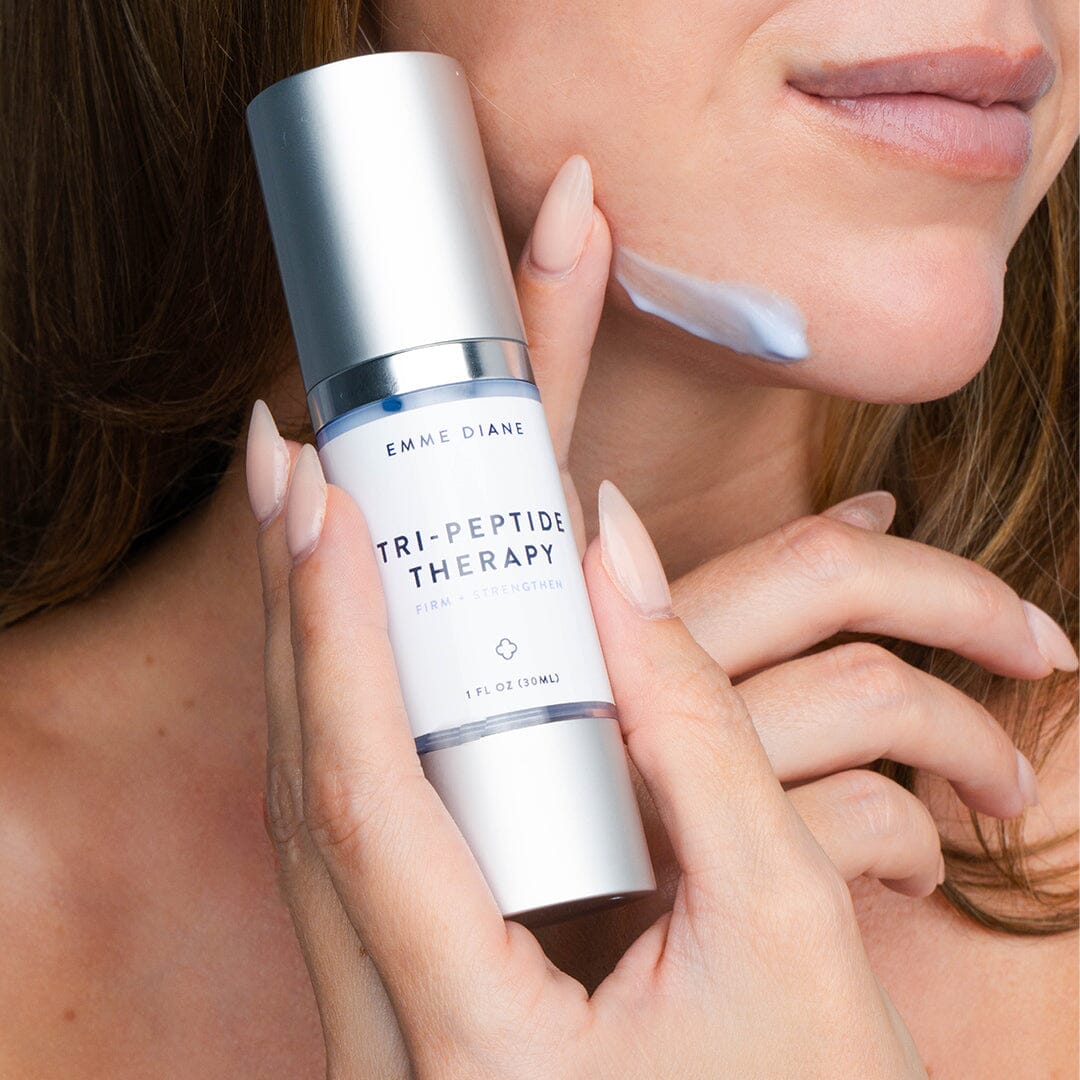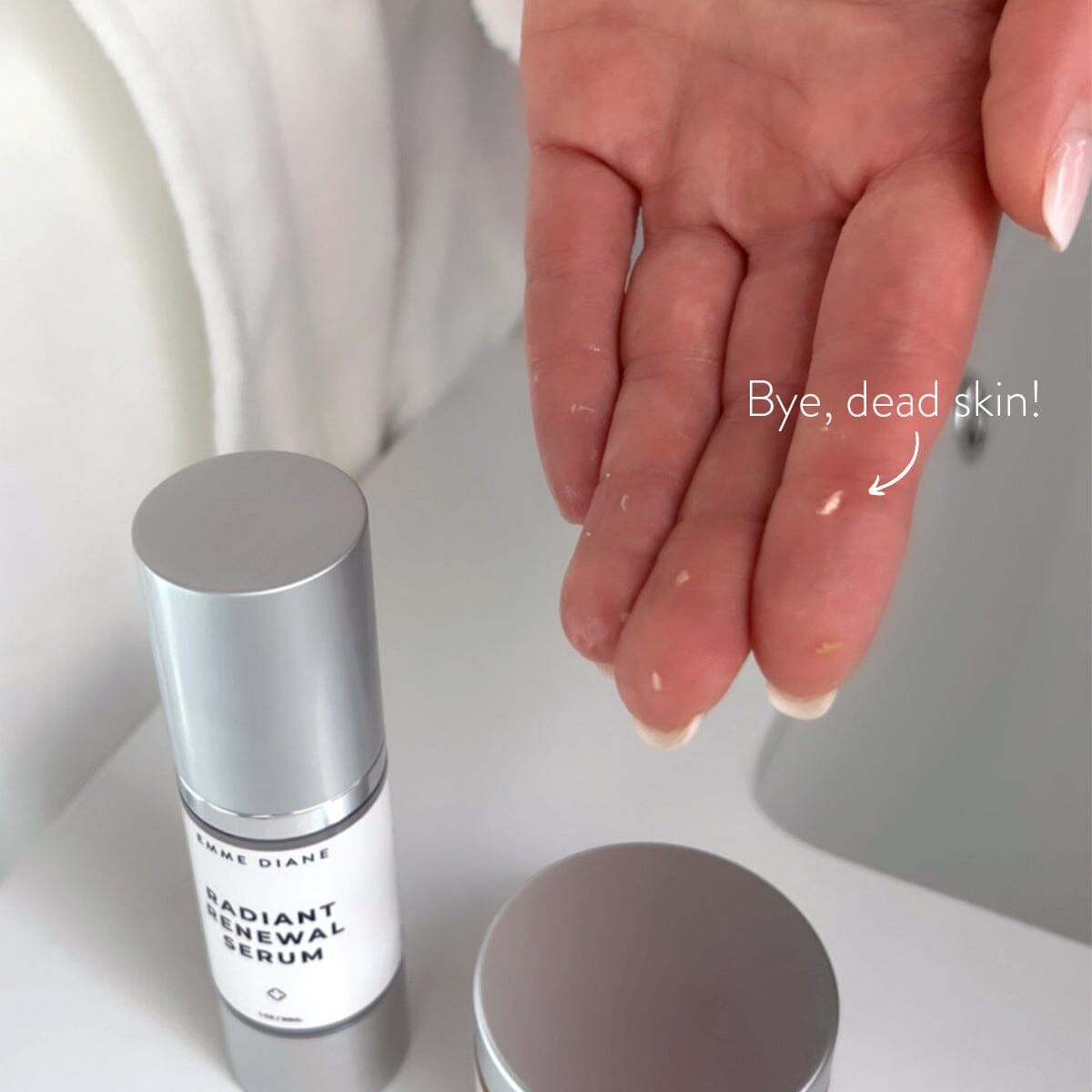Complete Guide to Acids
by Emily Linehan on August 24, 2023
Although the term “acid” may sound scary, acids should be a staple in almost everyone’s skincare routine. They are most commonly known for working as chemical exfoliants, which help to speed up cellular turnover, keep the skin smooth, and prevent new breakouts from forming. But, many acids also do more than just that - some can even lighten pigmentation, have antibacterial properties, reduce inflammation, and offer anti-aging benefits, among other things.
When it comes to acids in skincare, there is a lot to consider. But in order to know which one is right for you, it’s important to first understand the unique properties of each, so let's get into it!
Alpha Hydroxy Acids (AHAs)
Alpha Hydroxy Acids (AHAs) are a group of natural acids derived from various sources, including fruits, milk, and sugar. They gently exfoliate the skin's surface, sloughing off dead cells and promoting cell turnover. AHAs are ideal for brightening dull complexions, reducing hyperpigmentation, and minimizing fine lines. Glycolic Acid, derived from sugar cane, and Lactic Acid, found in milk, are two popular AHAs. However, one prominent member of the Alpha Hydroxy Acids family is Mandelic Acid. While it's traditionally sourced from bitter almonds, it can also be synthetically derived. This synthetic production not only offers a more consistent and controlled method, but it also helps circumvent potential allergies associated with almond derivatives. Like other AHAs, Mandelic Acid gently exfoliates the skin's surface, promoting the shedding of dead cells and stimulating cell turnover. However, Mandelic Acid stands out for its larger molecular structure, making it a gentler option compared to other AHAs. This makes it suitable for individuals with sensitive skin who may experience irritation from stronger acids. Mandelic Acid is also highly effective in brightening dull complexions, reducing hyperpigmentation, and minimizing the appearance of fine lines. Plus its antimicrobial properties make it beneficial for acne-prone skin, as it helps control breakouts and reduce inflammation. You can incorporate Mandelic Acid into your skincare routine with our Clarifying Serum for a smoother, more radiant complexion.
Beta Hydroxy Acids (BHAs)
Beta Hydroxy Acids (BHAs) are another category of acids commonly used in skincare, with Salicylic Acid being the most popular. Unlike AHAs, BHAs are oil-soluble, allowing them to penetrate deep into the pores. This makes BHAs particularly effective in treating acne-prone and oily skin types. BHAs work by exfoliating the skin from within the pores, helping to unclog them and reduce the formation of blackheads, whiteheads, and blemishes. The anti-inflammatory properties of BHAs also contribute to their effectiveness in calming redness and irritation associated with acne. Additionally, BHAs can regulate sebum production, helping to control excess oiliness and shine. Incorporating BHAs into your skincare routine with our Purifying Serum can help you get rid of even the most stubborn blackheads and prevent new breakouts from forming.
Hyaluronic Acid
Hyaluronic Acid (HA) is a powerful ingredient known for its exceptional hydrating properties. It attracts and retains moisture, keeping the skin hydrated, plump, and smooth. It also improves skin elasticity by stimulating collagen production, resulting in a more youthful appearance. Because of its soothing and calming properties, Hyaluronic Acid is suitable for all skin types, including those that are sensitive or reactive. It can be easily incorporated into any skincare routine, and its benefits are enhanced when used with other hydrating ingredients. You can find it in a variety of our products, including Skin Quencher Gel, Dew Drops Hydrating Serum, Firming Peptide Serum, Cucumber Cooling Mask, and Hydra-Revive Eye Cream.
L-Ascorbic Acid (Vitamin C)
L-Ascorbic Acid is the technical name for the most popular version of Vitamin C, which is renowned for its multitude of benefits. It is a potent antioxidant that helps protect the skin against environmental damage, such as UV rays and free radicals. I also want to note here that a notable derivative of Vitamin C is 3-O Ethyl Ascorbic Acid, which is what we use in our Brilliant-C Serum. This Vitamin C derivative contains the highest concentration of Ascorbic Acid to deliver all of the benefits of pure Vitamin C but with increased stability, allowing it to penetrate the deeper layers of the skin without causing irritation. In addition to its brightening and anti-aging benefits, it has also been shown to be more effective in repairing UV damage and has anti-inflammatory properties!
Kojic Acid
Kojic Acid is a naturally derived acid that is highly valued in skincare for its brightening and skin tone-evening properties. Kojic Acid works by inhibiting the production of melanin, the pigment responsible for dark spots, hyperpigmentation, and uneven skin tone. By blocking the enzyme tyrosinase, which is involved in melanin synthesis, Kojic Acid helps fade existing dark spots and prevents the formation of new ones. This acid is particularly beneficial for individuals with melasma, sunspots, or post-inflammatory hyperpigmentation and can be found in both our Brighten Up Serum and Enlightened Serum.
Azelaic Acid
Azelaic Acid is a versatile acid that offers multiple benefits for various skin concerns. It is naturally found in wheat, barley, and rye, but can also be produced synthetically. Azelaic Acid has anti-inflammatory and antimicrobial properties, making it effective in treating acne and reducing redness, inflammation, and post-acne marks. As a tyrosinase inhibitor, Azelaic Acid also has a brightening effect on the skin, helping to fade hyperpigmentation and even out skin tone. Azelaic Acid is suitable for most skin types and can be incorporated into your skincare routine through our Enlightened Serum.
Incorporating Acids into Your Routine
Whether you're looking to brighten dull skin, treat acne, or improve overall skin texture, the world of skincare acids has something to offer. However, finding the right acids for your skin type and concerns is key. So be sure to take advantage of our free consultation or check in if you're an existing client to determine what’s right for your unique skin!
xoxo,
Emme


